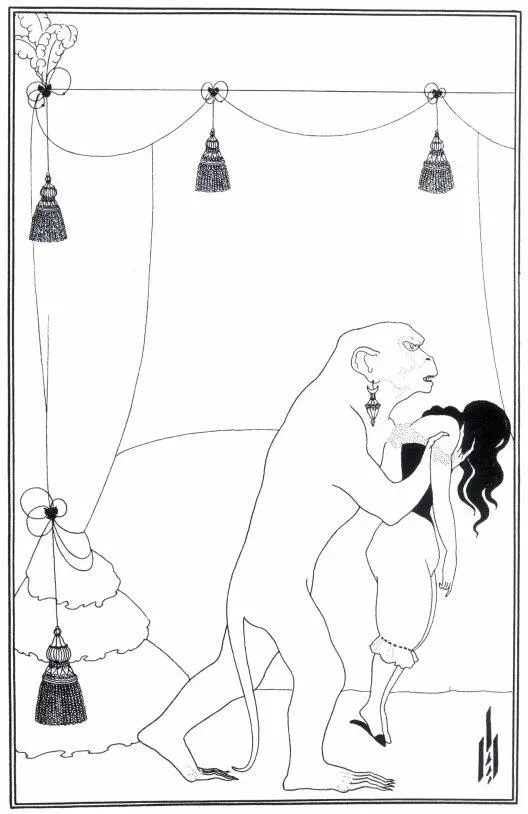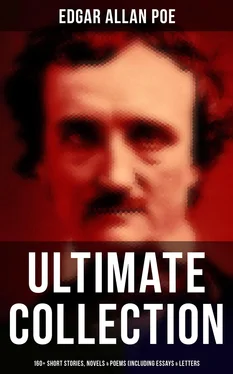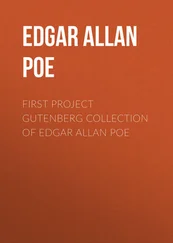Edgar Allan Poe
Edgar Allan Poe - Ultimate Collection: 160+ Short Stories, Novels & Poems (Including Essays & Letters)
The Raven, Murders in the Rue Morgue, The Tell-tale Heart… (With Biography)
Published by

Books
- Advanced Digital Solutions & High-Quality eBook Formatting -
musaicumbooks@okpublishing.info
2017 OK Publishing
ISBN 978-80-272-1907-0
Short Stories Short Stories Table of Contents
The Murders in the Rue Morgue
The Mystery of Marie Rogêt
The Purloined Letter
The Gold-Bug
Thou Art the Man
The Man of the Crowd
The Tell-Tale Heart
The Fall of the House of Usher
The Cask of Amontillado
The Black Cat
The Masque of the Red Death
The Pit and the Pendulum
Ligeia
The Oval Portrait (Life in Death)
A Tale of the Ragged Mountains
Eleonora
A Dream
Metzengerstein
The Assignation
Berenice
Morella
The Unparalleled Adventure of One Hans Pfaall
William Wilson
The Imp of the Perverse
Hop-Frog (Eight Chained Ourang-Outangs)
The Light-House
Ms. Found in a Bottle
A Descent into the Maelstrom
The Facts in the Case of M. Valdemar
The Balloon-Hoax
Mesmeric Revelation
The Thousand-and-Second Tale of Scheherazade
Some Words with a Mummy
Mystification
The Premature Burial
The Oblong Box
The Spectacles
The System of Dr. Tarr and Prof. Fether
The Sphinx
The Island of the Fay
The Landscape Garden
Morning on the Wissahiccon
The Domain of Arnheim
Landor’s Cottage
The Duc de l'Omelette
A Tale of Jerusalem
Loss of Breath (A Decided Loss)
Bon-Bon (The Bargain Lost)
Lionizing
King Pest
Four Beasts in One (The Homo-Cameleopard)
How to Write a Blackwood Article
A Predicament (The Scythe of Time)
The Devil in the Belfry
The Man That Was Used Up
The Business Man (Peter Pendulum)
Why the Little Frenchman Wears His Hand in a Sling
Never Bet the Devil Your Head
Three Sundays in a Week (A Succession of Sundays)
Diddling (Raising the Wind)
The Angel of the Odd
The Literary Life of Thingum Bob, Esq.
Mellonta Tauta
Von Kempelen and His Discovery
X-ing a Paragrab
The Power of Words
The Conversation of Eiros and Charmion
The Colloquy of Monos and Una
Shadow
Silence
Novels
The Narrative of Arthur Gordon Pym of Nantucket
The Journal of Julius Rodman
Poetical Works
The Raven
Poems of Later Life
Poems of Manhood
Scenes from Politian
Poems of Youth
Doubtful Poems
Other Poems
Play
Politian
Essays
The Philosophy of Composition
The Rationale of Verse
The Poetic Principle
Old English Poetry
Essays of Criticism
Essays on American Literature
A Few Words on Secret Writing
Maelzel's Chess Player
Eureka: A Prose Poem
Other Essays
Other Works
The Literati of New York
Autography
A Chapter on Autography
A Chapter on Science and Art
Fifty Suggestions
Pinakidia
Omniana
Doings of Gotham
Letters
Memorandum(Autobiographical Essay)
Biography
The Dreamer by Mary Newton Stanard
Table of Contents
The Murders in the Rue Morgue
Table of Contents

What song the Syrens sang, or what name Achilles assumed when he hid himself among women, although puzzling questions are not beyond all conjecture.
— SIR THOMAS BROWNE, Urn-Burial.
The mental features discoursed of as the analytical, are, in themselves, but little susceptible of analysis. We appreciate them only in their effects. We know of them, among other things, that they are always to their possessor, when inordinately possessed, a source of the liveliest enjoyment. As the strong man exults in his physical ability, delighting in such exercises as call his muscles into action, so glories the analyst in that moral activity which disentangles. He derives pleasure from even the most trivial occupations bringing his talents into play. He is fond of enigmas, of conundrums, of hieroglyphics; exhibiting in his solutions of each a degree of acumen which appears to the ordinary apprehension preternatural. His results, brought about by the very soul and essence of method, have, in truth, the whole air of intuition. The faculty of re-solution is possibly much invigorated by mathematical study, and especially by that highest branch of it which, unjustly, and merely on account of its retrograde operations, has been called, as if par excellence, analysis. Yet to calculate is not in itself to analyze. A chess-player, for example, does the one without effort at the other. It follows that the game of chess, in its effects upon mental character, is greatly misunderstood. I am not now writing a treatise, but simply prefacing a somewhat peculiar narrative by observations very much at random; I will, therefore, take occasion to assert that the higher powers of the reflective intellect are more decidedly and more usefully tasked by the unostentatious game of draughts than by all the elaborate frivolity of chess. In this latter, where the pieces have different and bizarre motions, with various and variable values, what is only complex is mistaken (a not unusual error) for what is profound. The attention is here called powerfully into play. If it flag for an instant, an oversight is committed, resulting in injury or defeat. The possible moves being not only manifold but involute, the chances of such oversights are multiplied; and in nine cases out of ten it is the more concentrative rather than the more acute player who conquers. In draughts, on the contrary, where the moves are unique and have but little variation, the probabilities of inadvertence are diminished, and the mere attention being left comparatively what advantages are obtained by either party are obtained by superior acumen. To be less abstract — Let us suppose a game of draughts where the pieces are reduced to four kings, and where, of course, no oversight is to be expected. It is obvious that here the victory can be decided (the players being at all equal) only by some recherche movement, the result of some strong exertion of the intellect. Deprived of ordinary resources, the analyst throws himself into the spirit of his opponent, identifies himself therewith, and not unfrequently sees thus, at a glance, the sole methods (sometimes indeed absurdly simple ones) by which he may seduce into error or hurry into miscalculation.
Whist has long been noted for its influence upon what is termed the calculating power; and men of the highest order of intellect have been known to take an apparently unaccountable delight in it, while eschewing chess as frivolous. Beyond doubt there is nothing of a similar nature so greatly tasking the faculty of analysis. The best chess-player in Christendom may be little more than the best player of chess; but proficiency in whist implies capacity for success in all these more important undertakings where mind struggles with mind.
Читать дальше














